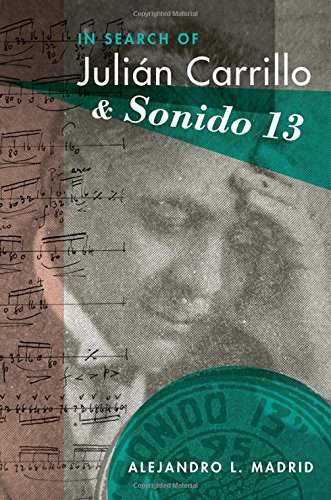In Search of Julian Carrillo and Sonido 13 by Alejandro L. Madrid
Book Review by León F. García Corona

The idea of Mexican composers often brings to mind such famous names as Carlos Chávez and Silvestre Revueltas. After all, these two composers are mostly known for their incorporation of a certain brand of Mexicanness in their musical output. How, then, did Julian Carrillo, a Mexican composer from the same period, fit into this paradigm? The easy answer is that he did not. This book tells the story of why he did not, but more importantly it questions the historical and political processes that determine what “fits.” To the reader unfamiliar with Madrid’s scholarship, the book might look at first glance as a rediscovery of a forgotten composer, a figure overlooked by history, or even as an attempt to include him in the canon. Carrillo, a prolific composer and educator, was often at odds with nationalistic narratives and the people who promulgated them (34, 35), a situation that effected his exclusion from the post-revolutionary Mexican music canon and its focus on nationalism (27). In Search of Julian Carrillo and Sonido 13 is not an uncritical celebration of Carrillo’s life and works, but rather a “cultural critique that takes him, his work, and his reception as points of departure for a study of cultural change, experimentalism, distinction, marginality, and cultural capital in twentieth-century Mexico” (3). Madrid’s point of departure is the problematic approach to Mexican music scholarship built upon binaries and grand narratives. According to him, the problem with such scholarship is “its assumption that Carrillo’s music is either a good or bad imitation of Austro-German models; it fails to consider consumption as an active process that transforms what is consumed . . . into different cultural artifacts whose meaning should be understood in relation to their specific cultural and historical circumstances…” (16). The author explores Carrillo’s positionality as a composer and as a Mexican, interacting in a country in the middle of a nation-building process where cultural actors had to negotiate nationalistic rhetoric and government-sponsored aesthetic agendas, all while in search of their own artistic voices…